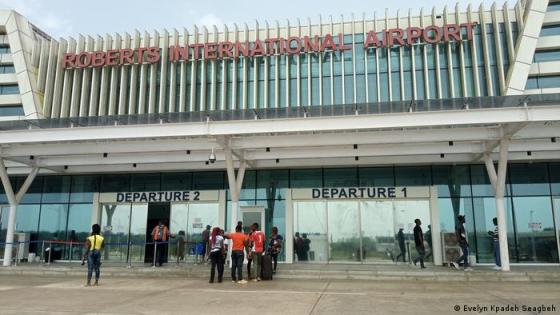Whither Liberia with our Main International Airport in Darkness?

On April 27, we captured an alarming Facebook video posted internationally by one of Liberia’s renowned online talk show hosts, Henry P. Costa. The video, obtained from an anonymous passenger on board the Brussels Airlines flight, indicated that the airliner, bound that same Wednesday evening for Roberts International Airport in Margibi County, Liberia, was being forced to return to Freetown, Sierra Leone, from where it had taken off a few hours earlier.
Why this sudden reversal in the flight? The Brussels Airlines pilot, on reaching Liberia’s airspace, discovered that the nation’s main airport, Roberts International, was in utter darkness — there was no electricity at that particular moment!
The airline crew immediately informed the passengers aboard the Brussels Airline flight 241about the very serious electrical problem at the airport and indicated that the flight had to be returned immediately to Freetown until a signal for a safe landing at RIA was received. During the 30-minute power outage, just as Brussels Airlines decided to return to Freetown, another inbound aircraft, Air France, entered the airspace just as lights at RIA were restored on the runway.
Brussels Airlines returned shortly thereafter, around 10 p.m. GMT when its passengers were safely offloaded. This is by no means an ordinary occurrence. It is rather a distinctly clear signal that the government of Liberia must become much, much more serious about managing its airports and undertaking all measures to ensure the smooth and efficient operations thereof.
The world knows that lighting at airports is extremely critical, for how does a pilot land an aircraft at night when there are no lights? That is most certainly a recipe for disaster. Lights are necessary on the runway even during daytime, because they help the pilots better to navigate their landing on ground.
Liberians have long been experiencing darkness, with the perennial absence of secure and reliable availability of electricity in the country. In our homes and offices, we can manage with the absence of electricity by using generators, lamps and candles. But airports are an entirely different, far more serious matter.
We recall the fatal night in April 1975 when Finance Minister Steven Tolbert, who had been on a scheduled two-day visit to Greenville, Sinoe County, suddenly decided very late in the evening to return to Monrovia, even though nightfall was fast approaching in that heavily forested county. Why? During the first day of the meeting, Minister Tolbert had become angry with one of the participants and demanded that his pilot, John Moore, fly the Finance Minister back to Monrovia immediately.
The pilot, unfortunately, courageously told Minister Tolbert that there was a problem with the plane that made it unadvisable to take off from Greenville at night. But the Finance Minister insisted. The plane went up and seconds later plunged into the Atlantic Ocean, killing all aboard, including the pilot, Finance Minister Tolbert, and several young men and women just out of college who had accompanied the Minister to Greenville.
We recall this tragic episode to impress upon President George Weah and the entire government of Liberia the critical importance of taking electricity SERIOUSLY, especially at our airports. Yes, we all know it is bad enough to sleep in darkness, which most of us in Liberia must do every night at this time of our beleaguered (sad, stressed, long-suffering) existence. But to tell ourselves that we must operate our great, historic international airport, RIA, named after our First President, in darkness is a bit much — detestable, sad and terribly unfortunate.
We call on our government, headed by President George M. Weah, to take far more seriously the running of the government. We did not ask them to head and lead our government: it was their choice — they asked for it and we gave it to them. Now that they have it as our leaders, they must LEAD. This surely is not like playing football, which has led our President, inadvisably, to create a football pitch on the main thoroughfare leading to downtown Monrovia.
As an ardent footballer, this is something he felt he had to do, even dangerously at the main end of the Spriggs Payne Airfield in Central Monrovia and on the busiest passage to the center of the capital. Does the President have officials who are not afraid to tell him the truth? It seems he clearly does not.
What this tells is that we are as a nation in very deep and serious trouble — we are landed with a President whose closest officials are afraid to tell him the truth. We saw this under Tubman, Tolbert, Doe, Taylor, and now Weah—and that is why in this desperate, terrible situation as a nation. One can understand why our newspaper, the Daily Observer, was compelled to suffer so much under the Samuel Doe regime. We tried our hardest to tell him the truth, but he reacted angrily, with arrests, imprisonments and even arson attacks — three times he tried to burn us down!
But thank God, we persevered. Doe is gone, and we are still here, doing the same things for which he cruelly, persistently, and vigorously punished us.
